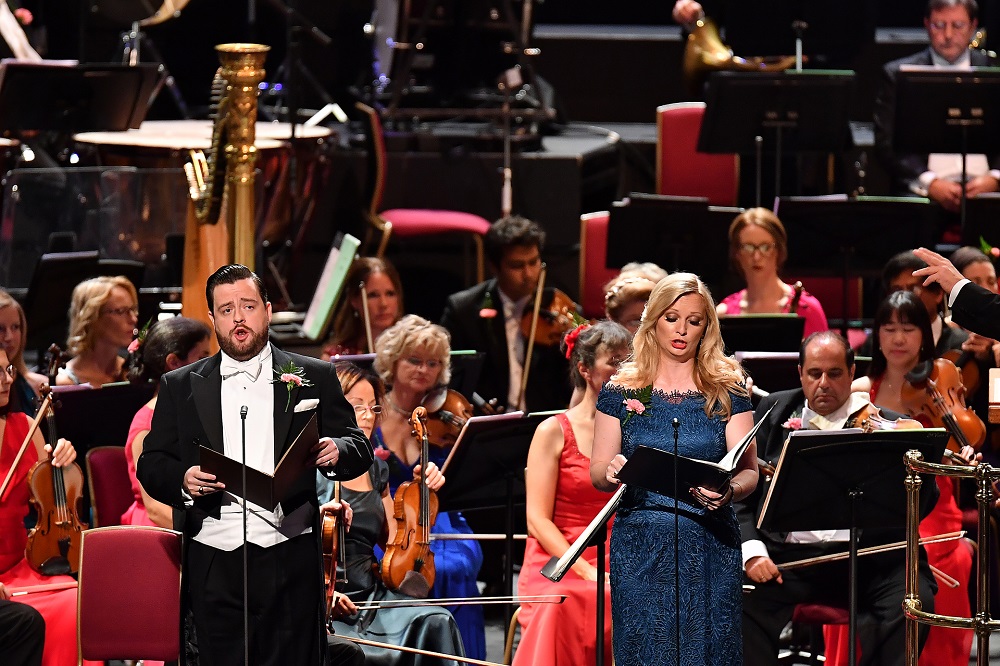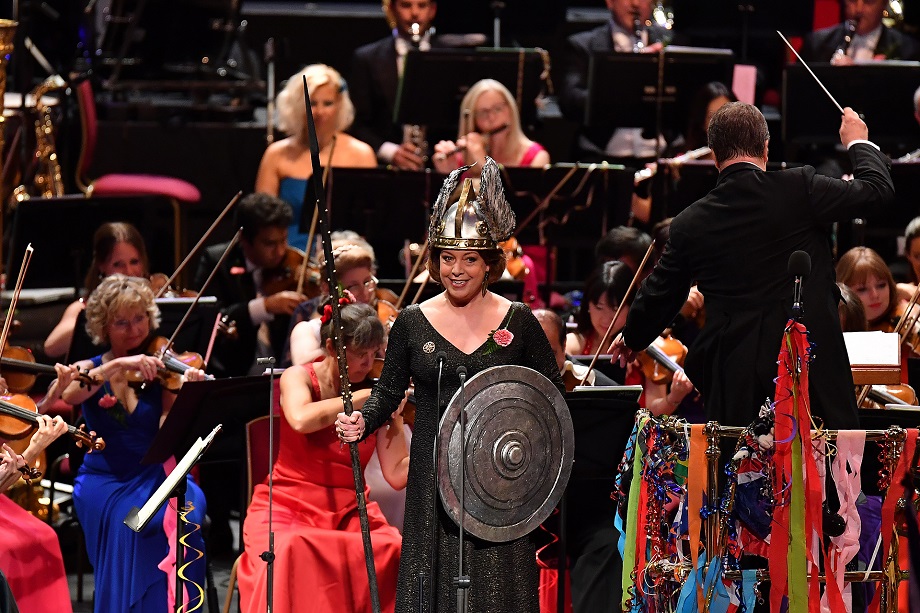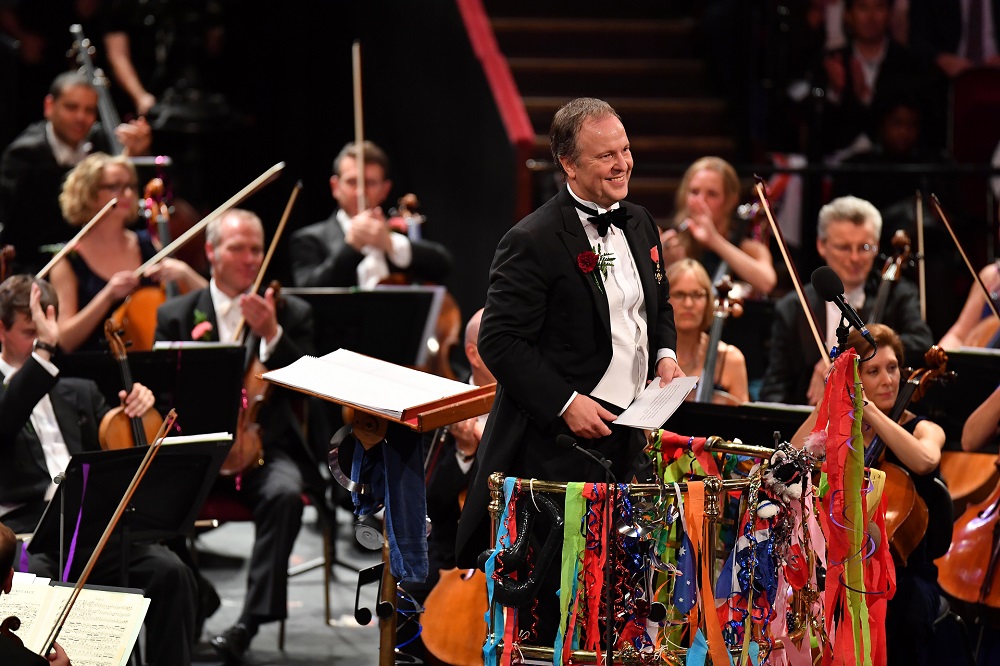Last Night of the Proms review: Stemme, BBCSO, Oramo - international array, abundant blue and gold | reviews, news & interviews
Last Night of the Proms review: Stemme, BBCSO, Oramo - international array, abundant blue and gold
Last Night of the Proms review: Stemme, BBCSO, Oramo - international array, abundant blue and gold
Final celebrations for a fine season efficient, varied, and fun as ever
The Last Night of the Proms is always a beautifully choreographed event, and this year’s was no exception. The format changes little, but each year a new selection of works is chosen to fill the slots.
By recent tradition, the Last Night opens with a premiere. The commission presumably calls for a five-minute work, in a light, scherzo character, but with plenty of action for all the sections of the orchestra, and each year the chosen composer delivers exactly that. Lotta Wennäksoki, a young Finnish composer, ticked all those boxes with her Flounce, but also managed to project a personality through all the gimmicks: plenty of percussion, slapstick trombone glissandos, but all imaginatively woven together into a concise and well-crafted score.
The first choral number was Kodály’s Budavári Te Deum. It’s a big piece, over 20 minutes long and employing choir, orchestra and four soloists. Kodály makes excellent use of his amassed forces, with intricate polyphony in the choral writing, and sumptuous orchestral accompaniment. The BBC Singers and Symphony Chorus rose to the many challenges, as did the soloists, with soprano Lucy Crowe (pictured below with tenor Ben Johnson) standing out for the rarefied beauty of her tone, well projected across often heavy accompaniment.
I could have managed without the choral-and-orchestral version of Sibelius’s Finlandia. This was its first performance at the Proms, suggesting that its nationalistic overtones are too much, even for this event. Sakari Oramo took the work at a brisk pace, with very little shaping of phrases, and some messy brass chords at the opening, with poor ensemble later on, suggested under-rehearsal. Fortunately, the performance was salvaged by the massed chorus, given a magisterial account of the concluding hymn.
The evening’s guest star was Wagnerian soprano Nina Stemme (pictured below in second half mode), on home turf in the first half with the Liebestod from Tristan und Isolde. The opera’s Prelude was also included and, as in the Sibelius, Oramo seemed clinical, at least at the start, although he gradually relaxed into the sumptuous string sonorities. Stemme’s voice has lost some of its lustre in recent years, but she still has the projection and security of the tone required for this demanding music.
Stemme then returned for some cabaret numbers, making a classy act out of Weill and Gershwin, although there was never any doubt that this was an opera singer slumming it. How strange to hear a Wagnerian singer of this calibre amplified and singing English with an American accent – we heard Weill in English and German, the latter far more convincing.
Henry Wood’s Fantasia on British Sea-Songs tends to get chopped and changed to fit the programme, and this year large sections were removed to make way for choral arrangements of songs from Scotland, Ireland and Wales. The BBC has been making great efforts in recent years to integrate the satellite events from around the country into the Albert Hall concert, including, in previous years, television broadcasts into the hall. That never really worked, and this evening’s compromise was even stranger, with pictures from the other events shown on screens while the choirs present sang the arrangements in loose synch to the images. The arrangements themselves also needed a strong stomach, especially the saccharine suspension-laden version of Danny Boy. I’d much rather have heard Home, Sweet Home, and all the other sections of the Fantasia that we missed. No doubt they’ll all be back next year.
rating
Share this article
Add comment
The future of Arts Journalism
You can stop theartsdesk.com closing!
We urgently need financing to survive. Our fundraising drive has thus far raised £49,000 but we need to reach £100,000 or we will be forced to close. Please contribute here: https://gofund.me/c3f6033d
And if you can forward this information to anyone who might assist, we’d be grateful.

Subscribe to theartsdesk.com
Thank you for continuing to read our work on theartsdesk.com. For unlimited access to every article in its entirety, including our archive of more than 15,000 pieces, we're asking for £5 per month or £40 per year. We feel it's a very good deal, and hope you do too.
To take a subscription now simply click here.
And if you're looking for that extra gift for a friend or family member, why not treat them to a theartsdesk.com gift subscription?
more Classical music
 Scott, Irish Baroque Orchestra, Whelan, RIAM, Dublin review - towards a Mozart masterpiece
Characteristic joy and enlightenment from this team, but a valveless horn brings problems
Scott, Irish Baroque Orchestra, Whelan, RIAM, Dublin review - towards a Mozart masterpiece
Characteristic joy and enlightenment from this team, but a valveless horn brings problems
 Classical CDs: Voice flutes, flugelhorns and froth
Baroque sonatas, English orchestral music and an emotionally-charged vocal recital
Classical CDs: Voice flutes, flugelhorns and froth
Baroque sonatas, English orchestral music and an emotionally-charged vocal recital
 Kanneh-Mason, Britten Sinfonia, Shave, Milton Court - a grin and a big beaming smile
A pair of striking contemporary pieces alongside two old favourites
Kanneh-Mason, Britten Sinfonia, Shave, Milton Court - a grin and a big beaming smile
A pair of striking contemporary pieces alongside two old favourites
 theartsdesk at the New Ross Piano Festival - Finghin Collins’ musical rainbow
From revelatory Bach played with astounding maturity by a 22 year old to four-hand jazz
theartsdesk at the New Ross Piano Festival - Finghin Collins’ musical rainbow
From revelatory Bach played with astounding maturity by a 22 year old to four-hand jazz
 First Person: Manchester Camerata's Head of Artistic Planning Clara Marshall Cawley on questioning the status quo
Five days of free events with all sorts of audiences around Manchester starts tomorrow
First Person: Manchester Camerata's Head of Artistic Planning Clara Marshall Cawley on questioning the status quo
Five days of free events with all sorts of audiences around Manchester starts tomorrow
 Goldscheider, Brother Tree Sound, Kings Place review - music of hope from a young composer
Unusual combination of horn, strings and electronics makes for some intriguing listening
Goldscheider, Brother Tree Sound, Kings Place review - music of hope from a young composer
Unusual combination of horn, strings and electronics makes for some intriguing listening
 theartsdesk Q&A: composer Donghoon Shin on his new concerto for pianist Seong-Jin Cho
Classical music makes its debut at London's K-Music Festival
theartsdesk Q&A: composer Donghoon Shin on his new concerto for pianist Seong-Jin Cho
Classical music makes its debut at London's K-Music Festival
 Helleur-Simcock, Hallé, Wong, Bridgewater Hall, Manchester review - moving lyricism in Elgar’s concerto
Season opener brings lyrical beauty, crisp confidence and a proper Romantic wallow
Helleur-Simcock, Hallé, Wong, Bridgewater Hall, Manchester review - moving lyricism in Elgar’s concerto
Season opener brings lyrical beauty, crisp confidence and a proper Romantic wallow
 Kohout, Spence, Braun, Manchester Camerata, Huth, RNCM, Manchester review - joy, insight, imagination and unanimity
Celebration of the past with stars of the future at the Royal Northern College
Kohout, Spence, Braun, Manchester Camerata, Huth, RNCM, Manchester review - joy, insight, imagination and unanimity
Celebration of the past with stars of the future at the Royal Northern College
 Jansen, LSO, Pappano, Barbican review - profound and bracing emotional workouts
Great soloist, conductor and orchestra take Britten and Shostakovich to the edge
Jansen, LSO, Pappano, Barbican review - profound and bracing emotional workouts
Great soloist, conductor and orchestra take Britten and Shostakovich to the edge

Comments
Enjoyed Last Night on TV as
Small correction; for the
Corrected, with thanks.
Corrected, with thanks.